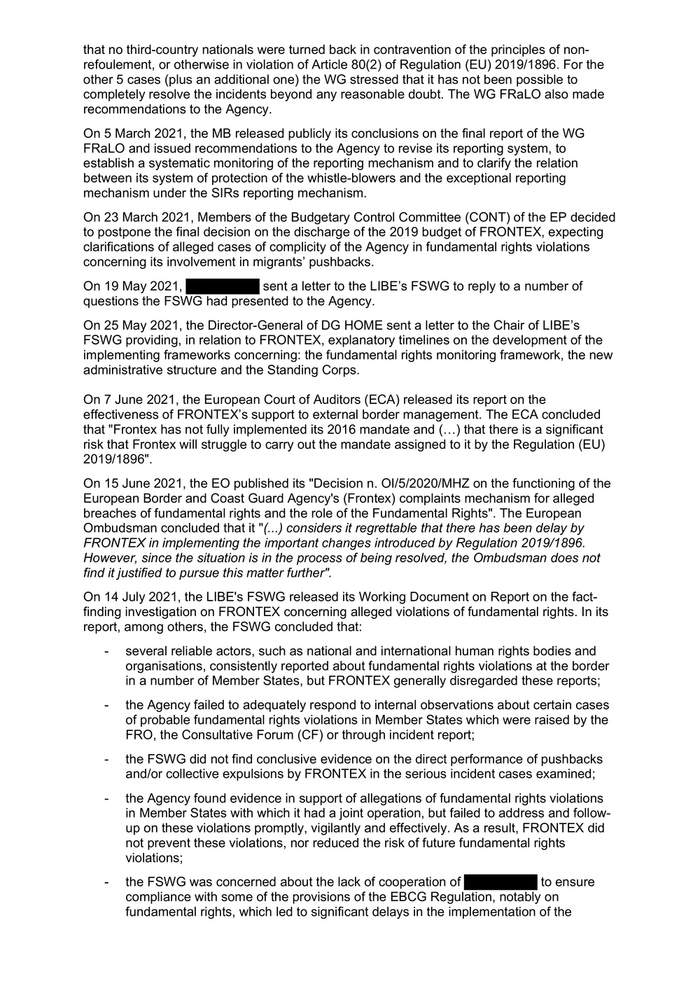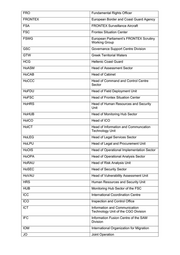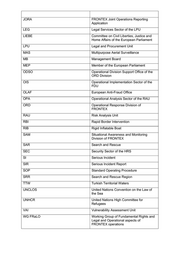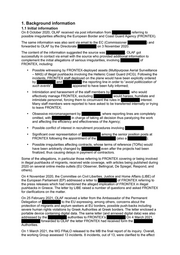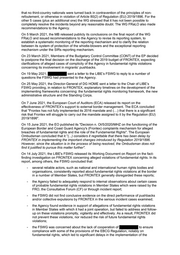OLAF Final Report on Frontex
CASE No OC/2021/0451/A1
Facsimile of original document. Length of redactions may appear different than in the original.
Directorate A – Expenditure – Operations and Investigations Unit A1 – Internal Investigations Brussels Olaf.03(2021)21088 1 SENSITIVE: OLAF Investigations FINAL REPORT CASE No OC/2021/0451/A1 Type of Case Investigation Legal Basis for the opening decision Article 4 of Regulation (EU, Euratom) No 883/2013 combined with Article 2 of the Commission Decision 1999/352 OLAF Staff ████████ Date of creation of OLAF case 30 April 2021 Date of opening decision 3 May 2021 (the case OC/2021/0451/A1 was opened as a split of the initial case OC/2020/0866/A1, the opening date of which is 11 November 2020) EU institution, body, office or agency European Border and Coast Guard Agency concerned (FRONTEX) Person(s) concerned Natural persons: ████████ ████████ ████████ Source of information ████████ Fraud Notification System (FNS) [X] Yes [ ] No Offence category Serious misbehavior Area concerned EU Decentralised Agencies Investigative or Coordination activities Collection and analysis of information from carried out open sources 1 Handling instructions for SENSITIVE are given at ec.europa.eu/anti-fraud/sites/antifraud/files/handling_instructions_documents_sensitive_olaf_Investiga tions-en.pdf

Inspection of FRONTEX premises Digital Forensic Operations and Operational Analysis of digital data Interview of 20 witnesses Has he person concerned been notified of Notified on: the opening of an investigation? Reason(s) for deferral? ████████ Deferred on: N/A Has the person concerned been given the Given opportunity to comment: all persons opportunity to comment on facts concerning concerned were given the opportunity to him? Reason(s) for deferral? comment on 4 October 2021 Deferred on: N/A Evidence of irregularity or fraud [X] Yes [ ] No Financial and other impact Impact on EU financial interests [ ] Yes [X] No Serious matters relating to discharge of [X] Yes professional duties [ ] No Estimated financial impact of the facts N/A established Amounts prevented from being unduly N/A spent/evaded Judicial proceedings [ ] Yes [X] No Summary On 8 October 2020, OLAF received information by post from ████████ referring to possible irregularities affecting the European Border and Coast Guard Agency (FRONTEX). The initial allegations, complemented with additional information provided by the source, referred to serious irregularities involving ████████ top managers of FRONTEX. These irregularities included: Possible witnessing of illegal pushbacks by FRONTEX-deployed assets (Multipurpose Aerial Surveillance – MAS); Exclusion of the Fundamental Rights Officer (FRO) of FRONTEX from the reporting line; Intimidation, humiliation and harassment of staff members; Obsessive micromanagement and exclusion of intermediary reporting lines;

Possible conflict of interest in recruitment procedures; Possible irregularities affecting procurement contracts. Some of the allegations, notably those referring to FRONTEX covering or being involved in illegal pushbacks of migrants, received wide coverage during 2020 through online media outlets. Taking into account the allegations received, on 11 November 2020 OLAF opened the internal investigation OC/2020/0866/A1 into: A. potential misconduct and/or irregularities related to FRONTEX, possible involvement in and/or cover up of illegal pushbacks committed by ████████, and B. potential misconduct and/or irregularities in the internal functioning and management of FRONTEX committed by ████████, ████████ Having made significant progress with regard to the allegations under point A above, on 3 May 2021 OLAF decided to split the case, in order to expedite matters, and to extend the scope to be able to also investigate additional persons. As a result, case OC/2021/0451/A1 was opened; the scope of the new case was to investigate potential misconduct and/or irregularities related to FRONTEX in relation to possible involvement in and/or cover-up of illegal pushbacks committed, in particular, by ████████. ████████ were identified as persons concerned in case OC/2021/0451/A1. In order to prove or disprove the allegations, OLAF collected and analysed information and documentation from FRONTEX, from the European Commission, from open sources and from the persons concerned. Between 8 and 11 December 2020, OLAF carried out an inspection of the offices of the ████████ persons concerned, together with digital forensic operations. Subsequently, OLAF conducted the operational analysis of the significant amount of digital data acquired. In addition to the interview of the ████████ persons concerned and of 20 witnesses, OLAF also collected information from 10 witnesses through questionnaires. OLAF concludes, based on the evidence collected during the investigation, that the allegations are proven. ████████ within their differing roles and responsibilities, committed serious misconduct and other irregularities. In doing so they hindered the capacity of FRONTEX to fully comply with its responsibilities, namely monitoring compliance with fundamental rights in its activities at the external borders, and ensuring respect for, protection and promotion of, fundamental rights, as enshrined in particular in the Charter of Fundamental Rights of the EU. The evidence collected and the facts established by OLAF are set out in Section 2 of this report. The failings of the persons concerned can be grouped into three main categories; failure to follow procedures and processes, failure in their duty of loyalty and failure in their managerial responsibilities. Section 2.2.1 of this report demonstrates how ████████ failed to ensure compliance with the applicable Standard Operating Procedures on Serious Incident Reporting. This led to the exclusion of the FRO from the assessment and handling of some incidents and to the failure to initiate Serious Incident Reports for some incidents with a potential fundamental rights component. Section 2.2.1 also demonstrates how the ████████ persons concerned decided to relocate a FRONTEX aerial asset to a different operational area of activity. One reason for doing so appears to have been to avoid witnessing incidents in the Aegean Sea with a potential FR component. Section 2.2.2 demonstrates how ████████ the latter conveying the instructions

████████ received, acted directly or instructed FRONTEX entities to act in a way which resulted in a severe limitation of the access by the FRO, the Associate FRO and the FRO ad interim to information available within the Agency, including in the EUROSUR system. This had a negative impact on the ability of the FRO’s Office to effectively perform its tasks, notably monitoring the Agency’s compliance with, and promoting the Agency’s respect of, fundamental rights. Sections 2.2.1, 2.2.9 and 2.2.5 demonstrate that ████████ did not ensure appropriate follow-up actions, including with regard to the application of the Article 46 of the 2019 FRONTEX Regulation, in relation to two incidents witnessed by FRONTEX ████████. ████████ failed to take appropriate action, including the initiation of a SIR, after having been informed that some FRONTEX co-financed assets appeared to have been involved in some incidents included in the digital material that FRONTEX received from the Turkish Authorities. ████████ failed to take appropriate action informed (on three different occasions) that FRONTEX-deployed officers might have preferred not to report officially some incidents that occurred under FRONTEX operations due to fears of repercussions from the Authorities of the host MS. Section 2.2.3 demonstrates that as a result of concerns that some members of the Management Board (MB), including its Chair, might have tried to protect the FRO (to the point that ████████ alleged the existence of a conflict of interest situation, including “political” conflict of interest, involving some of the members of the MB) ████████ and ████████ instructed the relevant FRONTEX entitles to publish, under strict confidentiality, the vacancy notices for the FRO and Deputy FRO posts (among others), without the prior involvement of the MB (for the FRO post) or the FRO (for the Deputy FRO post). ████████ also appears to have acted in this way so that the matter could be settled in advance of the appointment of the new ████████ Commissioner, whom ████████ considered to be too supportive of fundamental rights issues. Section 2.2.4 demonstrates how, in the framework of an administrative inquiry against ████████, ████████ overruled the applicable Decision of the Management Board of FRONTEX, attributing to the DED the responsibility to launch the administrative inquiry. ████████ did not ensure compliance with the EU administration standards in relation to the reasonable duration of the inquiry, as set in the European Code of Good Administrative Behaviour (mirrored in the FRONTEX Code of Conduct). ████████ also disclosed to persons with no direct need-to-know some details about the allegations ████████ (████████ being the subject of the inquiry) and about allegations against ████████ which had not been formalized officially. ████████ also provided misleading information to some members of ████████ Cabinet about the conclusions of the administrative inquiry against ████████. The evidence in Section 2.2.7 shows that, animated as they were by their personal considerations regarding European legislators, ████████ and ████████ demonstrated a lack of loyalty towards the Union. They partly based their decisions on their personal prejudices and the low esteem in which they held the European Commission (EC), particularly some officials of ████████. They considered the latter to be overly focused on fundamental rights matters and too bureaucratic, with no understanding of the operational challenges of external border management. ████████ also failed to demonstrate a constructive approach with the EC regarding the implementation of the new legal framework of the Agency, in particular regarding the fundamental rights architecture, thus causing severe delays to the whole process. In this context, despite ████████ role as ████████ of Frontex, ████████ also suggested to a member of the MB which issues to raise during a MB meeting so as to put the EC representative at the MB in a difficult position. The evidence gathered by OLAF in Section 2.2.8 demonstrates that between 2017 and 2019, ████████ disclosed information to ████████, some of it delicate or sensitive, concerning the Agency under ████████ management, prior to it being made public. There was no justification for this as ████████ did not have a legitimate need-to-know. While requesting information about some incidents from the Authorities of a host Member

State, as well as while providing to EU Institutions (the EC and the EP) information about the way the Agency had dealt with fundamental rights-related matters, ████████ did not ensure the highest standards of impartiality and objectivity, presenting an incorrect or biased description of facts. The evidence is set out in Section 2.2.7 of this report. ████████ also gave OLAF incorrect information about the process of the revision of the Standard Operating Procedure on Serious Incidents Reporting. The evidence is set out in Section 2.2.6 of this report. During a meeting with the members of the FRaLO Subworking Group, ████████ provided incorrect information about the involvement of the FRO in the handling of a Serious Incident Report. OLAF did not gather elements indicating the intentionality of such provision (see Section 2.2.1). OLAF considers the repeated misconduct of the persons concerned to be in breach of the Staff Regulation of Officials of the EU, of the FRONTEX Code of Conduct and of the legal framework stipulated by the FRONTEX Regulations (Regulation (EU) 2016/1624 and Regulation (EU) 2019/1896) in particular in relation to the protection and respect of fundamental rights, as enshrined in the Charter of Fundamental Rights of the European Union, in the performance of the Agency’s task. TABLE OF CONTENTS List of acronyms........................................................................................................................ 5 1. Background information........................................................................................................ 9 1.1 Initial information............................................................................................................. 9 1.2 Scope of the investigation............................................................................................. 11 1.3 Persons concerned....................................................................................................... 12 1.4 Issues investigated........................................................................................................ 12 1.5 General context............................................................................................................. 12 2. Investigative activities carried out and evidence collected................................................. 17 2.1 Investigative activities carried out.................................................................................. 17 2.2 Evidence collected........................................................................................................ 17 2.3 Facts established........................................................................................................ 109 3. Legal evaluation................................................................................................................ 112 3.1 Legal framework.......................................................................................................... 113 3.2Legal assessment........................................................................................................ 124 4. Estimated financial impact of the facts established.......................................................... 128 5. Comments of the persons concerned............................................................................... 129 6. Conclusions...................................................................................................................... 129 List of acronyms ASM Assessment Sector of the RAU BMD Business Management and Development

Office of the SAM Division CAB Cabinet CBD Capacity Building Division CCC Command and Control Centre Sector of the FSC CF Consultative Forum of FRONTEX CGO Corporate and Governance Division of FRONTEX CoE Council of Europe CONT Members of the Budgetary Control Committee of the European Parliament CPT European Committee for Prevention of Torture and Inhuman or Degrading Treatment or Punishment DCBD Director of the Capacity Building Division DCGO Director of Corporate and Governance Division DED Deputy Executive Director DG Home Directorate General for Migration and Home Affairs of the European Commission DORD Director of Operational Response Division DPO Data Protection Office DSAM Director of Situational Awareness and Monitoring Division EC European Commission ECA European Court of Auditors ECHR European Convention on Human Rights ECtHR European Court of Human Rights ED Executive Director EO European Ombudsman EP European Parliament EUCI EU Classified Information EUROSUR European Border Surveillance System FDU Field Deployment Unit FLO FRONTEX Liaison Officer FR Fundamental Rights FRAU Fundamental Rights Agency FRMs Fundamental Rights Monitors

FRO Fundamental Rights Officer FRONTEX European Border and Coast Guard Agency FSA FRONTEX Surveillance Aircraft FSC Frontex Situation Center FSWG European Parliament’s FRONTEX Scrutiny Working Group GSC Governance Support Centre Division GTW Greek Territorial Waters HCG Hellenic Coast Guard HoASM Head of Assessment Sector HoCAB Head of Cabinet HoCCC Head of Command and Control Centre Sector HoFDU Head of Field Deployment Unit HoFSC Head of Frontex Situation Center HoHRS Head of Human Resources and Security Unit HoHUB Head of Monitoring Hub Sector HoICO Head of ICO HoICT Head of Information and Communcation Technology Unit HoLEG Head of Legal Services Sector HoLPU Head of Legal and Procurement Unit HoOIS Head of Operational Implementation Sector HoOPA Head of Operational Analysis Sector HoRAU Head of Risk Analysis Unit HoSEC Head of Security Sector HoVAU Head of Vulnerability Assessment Unit HRS Human Resources and Security Unit HUB Monitoring Hub Sector of the FSC ICC International Coordination Centre ICO Inspection and Control Office ICT Information and Communication Technology Unit of the CGO Division IFC Information Fusion Centre of the SAM Division IOM International Organization for Migration JO Joint Operation

JORA FRONTEX Joint Operations Reporting Application LEG Legal Services Sector of the LPU LIEBE Committee on Civil Liberties, Justice and Home Affairs of the European Parliament LPU Legal and Procurement Unit MAS Multipurpose Aerial Surveillance MB Management Board MEP Member of the European Parliament ODSO Operational Division Support Office of the ORD Division OIS Operational Implementation Sector of the FDU OLAF European Anti-Fraud Office OPA Operational Analysis Sector of the RAU ORD Operational Response Division of FRONTEX RAU Risk Analysis Unit RBI Rapid Border Intervention RIB Rigid Inflatable Boat SAM Situational Awareness and Monitoring Division of FRONTEX SAR Search and Rescue SEC Security Sector of the HRS SI Serious Incident SIR Serious Incident Report SOP Standard Operating Procedure SRR Search and Rescue Region TTW Turkish Territorial Waters UNCLOS United Nations Convention on the Law of the Sea UNHCR United Nations High Committee for Refugees VAI Vulnerability Assessment Unit WG FRaLO Working Group of Fundamental Rights and Legal and Operational aspects of FRONTEX operations
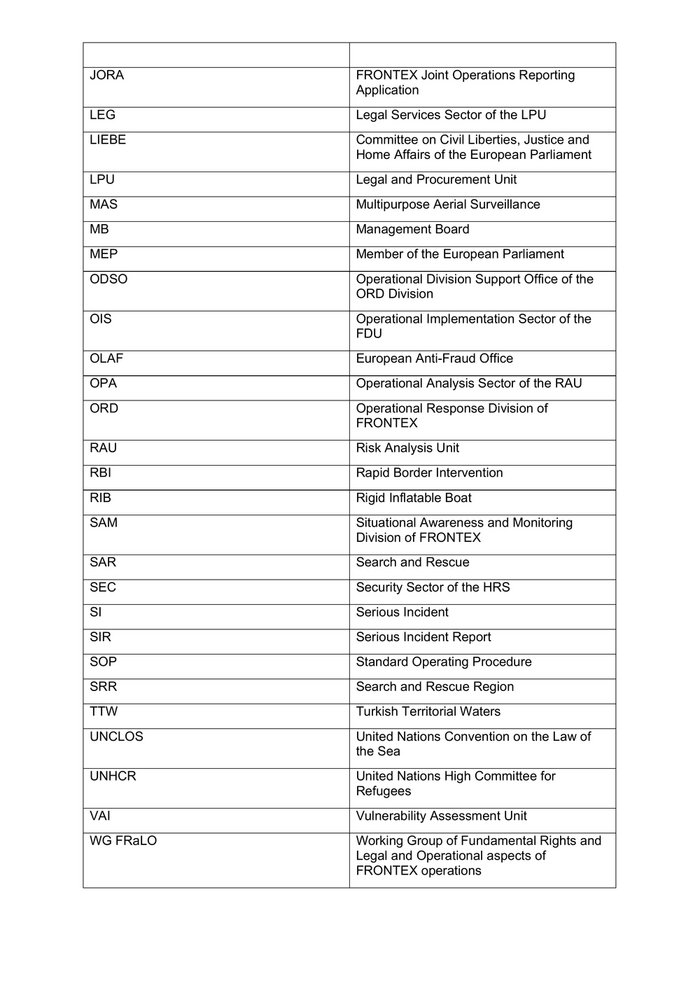
1. Background information 1.1 Initial information On 8 October 2020, OLAF received via post information from ████████ referring to possible irregularities affecting the European Border and Coast Guard Agency (FRONTEX). The same information was also sent via email to the EC (Commissioner ████████) and forwarded to OLAF by the Directorate ████████ on 3 November 2020. The content of the information suggested the source was ████████. OLAF got successfully in contact via email with the source who provided additional information to complement the initial allegations of serious irregularities, involving ████████ of FRONTEX, including: Possible witnessing by FRONTEX-deployed assets (Multipurpose Aerial Surveillance – MAS) of illegal pushbacks involving the Hellenic Coast Guard (HCG). Following the incidents, FRONTEX staff deployed on the plane would have been explicitly ordered by ████████ and ████████ the reporting line in order to “avoid politicization of such events”. ████████ appeared to have been fully informed; Intimidation and harassment of the staff members by ████████, who would effectively manage FRONTEX, excluding ████████ would harass, humiliate and intimidate personnel, forcing them to circumvent the rules in ████████ interest. Many staff members were reported to have asked to be transferred internally or trying to leave FRONTEX; Obsessive micromanagement by ████████, where reporting lines are completely omitted, with ████████ in charge of taking all decision thus paralyzing the work and affecting the efficiency and effectiveness of the Agency; Possible conflict of interest in recruitment procedures involving ████████; Significant over representation of ████████ among the senior position posts at FRONTEX following the appointment of the ████████ (also a ████████); Possible irregularities affecting contracts, whose terms of reference (TORs) would have been arbitrarily changed by ████████ even after the projects had been finalized, thus causing delays in payment of contractors. Some of the allegations, in particular those referring to FRONTEX covering or being involved in illegal pushbacks of migrants, received wide coverage, with articles being published during 2020 on several online media outlets (EU Observer, Bellingcat, De Spiegel, Respond, and others). On 4 November 2020, the Committee on Civil Liberties, Justice and Home Affairs (LIBE) of the European Parliament (EP) addressed a letter to ████████ of FRONTEX referring to the press releases which had mentioned the alleged implication of FRONTEX in illegal pushbacks in Greece. The letter by LIBE raised a number of questions and asked FRONTEX for clarifications on the matter. On 25 February 2021, OLAF received a letter from the Ambassador of the Permanent Delegation of ████████ to the EU expressing, among others, concerns about the protection of migrants and asylum seekers at EU borders, possible push-backs including severe human rights violations by Greek Authorities at Greek borders. The letter enclosed a portable device containing digital data. The same letter (and annexed digital data) was also addressed by the ████████ authorities to FRONTEX’s ████████ On 4 March 2021, ████████ forwarded to OLAF the letter FRONTEX had received form the ████████ Authorities. On 1 March 2021, the WG FRaLO released to the MB the final report of its inquiry. Overall, the working Group assessed 13 incidents. 8 incidents, out of 13, were clarified to the effect
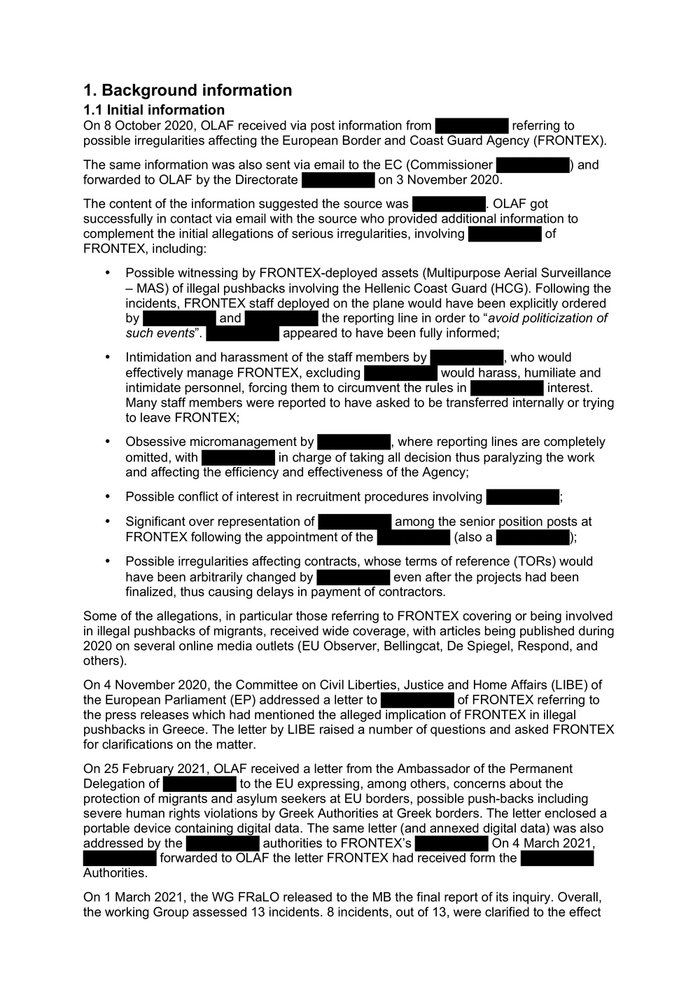
that no third-country nationals were turned back in contravention of the principles of non- refoulement, or otherwise in violation of Article 80(2) of Regulation (EU) 2019/1896. For the other 5 cases (plus an additional one) the WG stressed that it has not been possible to completely resolve the incidents beyond any reasonable doubt. The WG FRaLO also made recommendations to the Agency. On 5 March 2021, the MB released publicly its conclusions on the final report of the WG FRaLO and issued recommendations to the Agency to revise its reporting system, to establish a systematic monitoring of the reporting mechanism and to clarify the relation between its system of protection of the whistle-blowers and the exceptional reporting mechanism under the SIRs reporting mechanism. On 23 March 2021, Members of the Budgetary Control Committee (CONT) of the EP decided to postpone the final decision on the discharge of the 2019 budget of FRONTEX, expecting clarifications of alleged cases of complicity of the Agency in fundamental rights violations concerning its involvement in migrants’ pushbacks. On 19 May 2021, ████████ sent a letter to the LIBE’s FSWG to reply to a number of questions the FSWG had presented to the Agency. On 25 May 2021, the Director-General of DG HOME sent a letter to the Chair of LIBE’s FSWG providing, in relation to FRONTEX, explanatory timelines on the development of the implementing frameworks concerning: the fundamental rights monitoring framework, the new administrative structure and the Standing Corps. On 7 June 2021, the European Court of Auditors (ECA) released its report on the effectiveness of FRONTEX’s support to external border management. The ECA concluded that "Frontex has not fully implemented its 2016 mandate and (…) that there is a significant risk that Frontex will struggle to carry out the mandate assigned to it by the Regulation (EU) 2019/1896". On 15 June 2021, the EO published its "Decision n. OI/5/2020/MHZ on the functioning of the European Border and Coast Guard Agency's (Frontex) complaints mechanism for alleged breaches of fundamental rights and the role of the Fundamental Rights". The European Ombudsman concluded that it "(...) considers it regrettable that there has been delay by FRONTEX in implementing the important changes introduced by Regulation 2019/1896. However, since the situation is in the process of being resolved, the Ombudsman does not find it justified to pursue this matter further". On 14 July 2021, the LIBE's FSWG released its Working Document on Report on the fact- finding investigation on FRONTEX concerning alleged violations of fundamental rights. In its report, among others, the FSWG concluded that: - several reliable actors, such as national and international human rights bodies and organisations, consistently reported about fundamental rights violations at the border in a number of Member States, but FRONTEX generally disregarded these reports; - the Agency failed to adequately respond to internal observations about certain cases of probable fundamental rights violations in Member States which were raised by the FRO, the Consultative Forum (CF) or through incident report; - the FSWG did not find conclusive evidence on the direct performance of pushbacks and/or collective expulsions by FRONTEX in the serious incident cases examined; - the Agency found evidence in support of allegations of fundamental rights violations in Member States with which it had a joint operation, but failed to address and follow- up on these violations promptly, vigilantly and effectively. As a result, FRONTEX did not prevent these violations, nor reduced the risk of future fundamental rights violations; - the FSWG was concerned about the lack of cooperation of ████████ to ensure compliance with some of the provisions of the EBCG Regulation, notably on fundamental rights, which led to significant delays in the implementation of the
